政治家と増税
この風刺画について
この風刺画「政治家の仕事」は現代政治に感じる違和感を視覚化したものです。
「TAX INCREASE(増税)」という単純なフレーズを持った政治家が、異なる社会状況の中で同じように登場する構図で、政治の在り方に対する問いかけを行っています。
TOPの風刺画は左から順に、貧困層の高齢者、低所得の中年層、そして途上国の子どもたちと、それぞれ異なる地域や人々を想定して描いています。
どの場面でも共通しているのは、政治家の明るい表情と「増税」という言葉を掲げる姿です。
一方、彼らの足元にいる市民たちは、驚き、怒り、戸惑いといった感情を露わにしています。
このギャップは、政治的意思決定と市民感情との間に存在する「温度差」を象徴しています。
なぜ、多くの人々が苦しんでいる中で笑顔で増税を宣言できるのか。
その疑問こそが、この風刺画を描いた最大の動機です。
また、あえて「どの国の話」とは明示していません。
それはこの問題が、特定の地域だけでなく、あらゆる国や文化に共通する普遍的な課題であると考えているからです。
読者や鑑賞者が自身の国や地域に置き換えて考えるきっかけになることを願っています。
風刺は単なる批判の道具ではありません。
この作品もまた、怒りや皮肉よりも、「考えるきっかけ」として機能することを意図して制作しています。
政治家の姿を笑顔で描いたのも、その違和感を強調するための表現技法です。
この風刺画を見て「自分ならどう感じるか?」を考えていただけたら幸いです。
風刺画のポイント
この風刺画における最大のポイントは、「政治家が誰の上に立っているか」という視覚的構成にあります。
それぞれの政治家は、箱の上に立ち、市民の視点よりも高い位置から「TAX INCREASE(増税)」のプラカードを掲げています。
この風刺画は、政治的権力の優位性、つまり「上から目線の政策決定」を象徴しています。
さらに、その足元にある箱には微妙な違いがあります。
一枚目では「TREOPE!」と書かれた箱、二枚目では空箱、三枚目では再利用された果物箱のようなもの。
これは、政治家が立っている“基盤”が市民の生活から生まれたものであるという皮肉です。
つまり、市民の犠牲や困窮の上に立ってこそ成立している「演説の場」であるということを示唆しています。
また、登場する市民たちの表情や仕草も重要な要素です。
一様に驚いているわけではなく、それぞれ異なる反応を見せています。
中には、呆れたように目を逸らす者、悲しみで涙を浮かべる子ども、疑問の眼差しを向ける若者もいます。
これらは、現代市民の「政治に対する感情の分断」を表現しています。
本作では、色彩のトーンも工夫しました。
左のパネルはモノクロ調で、戦後や経済危機下の欧米を思わせる雰囲気に。
中央は現代的でややユーモラスなタッチ。
右側はアフリカや南アジアなど、発展途上地域をイメージしています。
これは「政治家の振る舞いは国や時代を超えて類似する」という普遍性を示すための演出です。
この風刺画を通して伝えたいのは、「税金を上げること自体」が問題なのではありません。
それをどのような態度で、誰の声を聞かずに行ってしまうかというプロセスの問題です。
今回は単に批判ではなく「思考の余白」を視聴者に残すことを目指しました。
この作品が、政治に対する新たな視点を持つきっかけとなれば幸いです。
AIが描いた「政治家の仕事」
AIが描いたイメージ(画像)
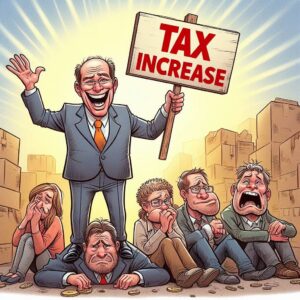 |
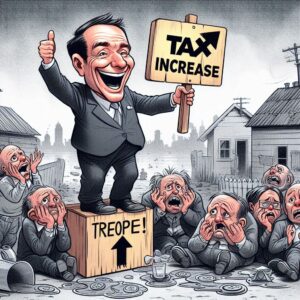 |
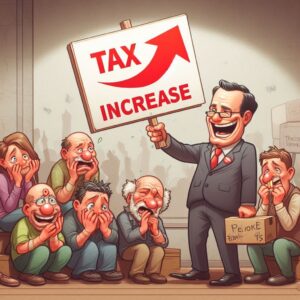 |
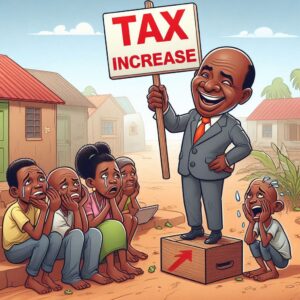 |
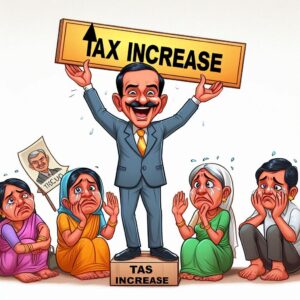 |
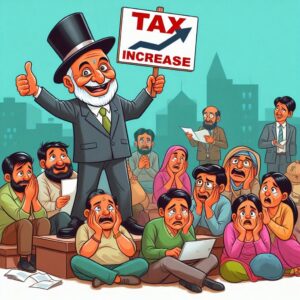 |
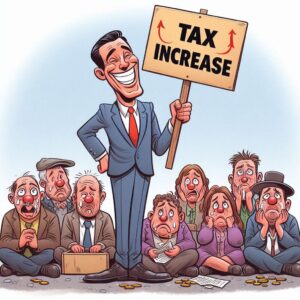 |

コメント